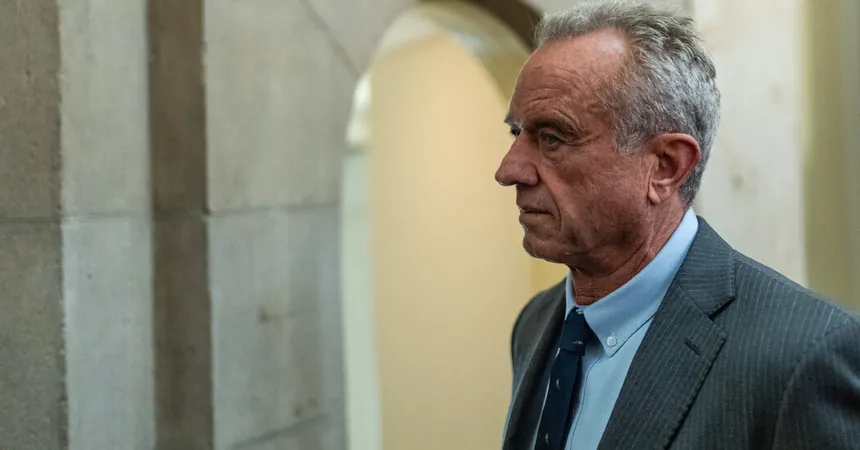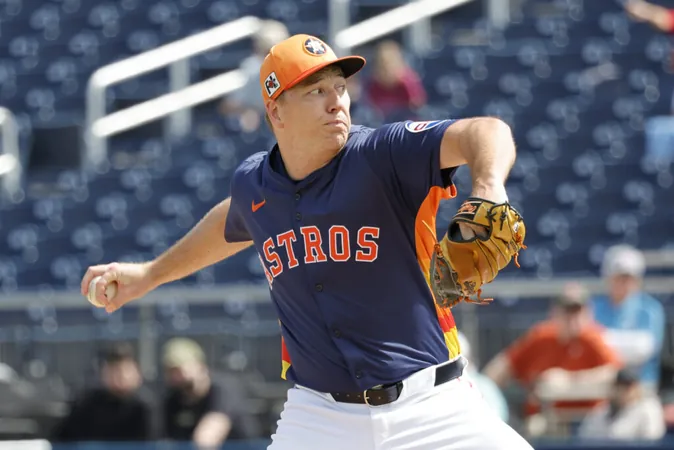
RFK Jr. Engages Discredited Vaccine Researcher in Controversial Autism Study
2025-03-27
Author: Ting
Introduction
In a surprising move, Robert F. Kennedy Jr., a prominent figure in the anti-vaccine movement, has recruited David Geier, a researcher with a controversial past, to join his health department for a new study examining the long-discredited theory linking vaccines, specifically mercury-based preservatives, to autism. This collaboration has raised alarm among public health experts who worry it could further undermine vaccine confidence during a time of rising hesitancy.
David Geier's Controversial Background
David Geier has long been associated with efforts to suggest a connection between vaccines and autism, mainly through articles claiming that mercury in vaccines causes neurological damage. However, his credibility took a significant hit in 2012 when Maryland state authorities found him practicing medicine without a license, alongside his father, Mark Geier, who had his medical license suspended for endangering children with autism and exploiting their families.
Rejecting Unreliable Research
The Geier duo has seen their research rejected by federal judges as unreliable, raising serious concerns about the quality and integrity of their scientific contributions. Experts have criticized Kennedy's decision to bring Geier into the fold, suggesting that it compromises the impartiality of any study on vaccine safety. Dr. Christopher Beyrer, director at the Duke Global Health Institute, emphasized that if vaccine hesitancy continues to rise, it could lead to more outbreaks of vaccine-preventable diseases, exacerbating public health risks.
Scrutiny of Kennedy’s Health Decisions
Kennedy’s decisions in his capacity as Health Secretary have drawn scrutiny. He cancelled a long-scheduled vaccine meeting and rolled back grants aimed at addressing vaccine hesitancy. The announcement of a large new study to explore the supposed vaccine-autism link came shortly after former President Trump expressed support for revisiting this contentious issue due to perceived rises in autism diagnoses—a claim many scientists argue stems from expanded awareness and better detection rather than a true increase in prevalence.
Autism Diagnosis Statistics
Statistics reveal that one in 36 children are currently diagnosed with autism—a stark rise from one in 150 in 2000. While some attribute this increase to improved diagnostic criteria and greater awareness, the debate continues over the roles of genetics and environmental factors. Experts argue that investigating discredited theories, like that of the Geiers, diverts attention and funding away from meaningful research that could better illuminate the true causes of autism.
Controversial Practices of the Geiers
As an example of the Geiers' controversial practices, Mark Geier faced previous allegations for promoting unproven treatments, including puberty-blocking drugs and chelation therapy—methods lacking scientific backing and potentially harmful to children. Public health advocates fear that appointing David Geier in an official government capacity could lead to misguided research outcomes that echo claims already discredited by the scientific community.
Calls for Clarity and Focus on Research
Calls for clarity regarding David Geier's role continue to intensify, particularly as health advocates stress the pressing need for scientifically sound research into autism rather than perpetuating myths that have been systematically debunked. The urgency for a focused approach is underscored by recent federal budget cuts impacting important health research, raising concerns that funding may be wasted on exploring harmful and unfounded vaccine theories. In an age where misinformation surrounding vaccines is rampant, establishing credible and constructive research avenues is more crucial than ever.

 Brasil (PT)
Brasil (PT)
 Canada (EN)
Canada (EN)
 Chile (ES)
Chile (ES)
 Česko (CS)
Česko (CS)
 대한민국 (KO)
대한민국 (KO)
 España (ES)
España (ES)
 France (FR)
France (FR)
 Hong Kong (EN)
Hong Kong (EN)
 Italia (IT)
Italia (IT)
 日本 (JA)
日本 (JA)
 Magyarország (HU)
Magyarország (HU)
 Norge (NO)
Norge (NO)
 Polska (PL)
Polska (PL)
 Schweiz (DE)
Schweiz (DE)
 Singapore (EN)
Singapore (EN)
 Sverige (SV)
Sverige (SV)
 Suomi (FI)
Suomi (FI)
 Türkiye (TR)
Türkiye (TR)
 الإمارات العربية المتحدة (AR)
الإمارات العربية المتحدة (AR)